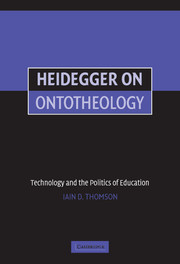Book contents
- Frontmatter
- Contents
- Acknowledgments
- A Note on the Notes
- Abbreviations Used for Works by Heidegger
- Introduction: Heidegger on Ontotheology
- 1 Ontotheology? Understanding Heidegger's Deconstruction of Metaphysics
- 2 Understanding Ontotheology as the Basis for Heidegger's Critique of Technology
- 3 Heidegger and the Politics of the University
- 4 Heidegger's Mature Vision of Ontological Education, or How We Become What We Are
- References
- Index
Introduction: Heidegger on Ontotheology
Published online by Cambridge University Press: 28 July 2009
- Frontmatter
- Contents
- Acknowledgments
- A Note on the Notes
- Abbreviations Used for Works by Heidegger
- Introduction: Heidegger on Ontotheology
- 1 Ontotheology? Understanding Heidegger's Deconstruction of Metaphysics
- 2 Understanding Ontotheology as the Basis for Heidegger's Critique of Technology
- 3 Heidegger and the Politics of the University
- 4 Heidegger's Mature Vision of Ontological Education, or How We Become What We Are
- References
- Index
Summary
Martin Heidegger is now widely recognized as one of the most influential philosophers of the twentieth century. Until the late 1960s, this impact derived mainly from his early magnum opus, Being and Time (published in 1927). Many of the twentieth century's most significant continental thinkers – including Hannah Arendt, Rudolf Bultmann, Hans-Georg Gadamer, Jürgen Habermas, Emmanuel Levinas, Herbert Marcuse, Maurice Merleau-Ponty, Jean-Paul Sartre, and Paul Tillich – acknowledge profound conceptual debts to the insights elaborated in this text. Being and Time was never finished, however, and Heidegger continued to develop, refine, and in some places revolutionize his own thinking for another fifty years. This “later” Heidegger's prolific body of work decisively influenced the next generation of continental philosophers, helping to shape the concepts and concerns of major contemporary figures such as Jean Baudrillard, Maurice Blanchot, Jacques Derrida, Hubert Dreyfus, Michel Foucault, Luce Irigaray, Jacques Lacan, Richard Rorty, and Charles Taylor, to name but a few. Despite this unparalleled impact, however, important aspects of Heidegger's later philosophy remain obscured by confusion and controversy.
Heidegger on Ontotheology: Technology and the Politics of Education seeks to clarify five interrelated aspects of Heidegger's later thought, namely, his neglected understanding of metaphysics as ontotheology, his controversial critique of technology, his appalling misadventure with Nazism, his prescient critique of the university, and, finally, his important philosophical suggestions for the future of higher education.
- Type
- Chapter
- Information
- Heidegger on OntotheologyTechnology and the Politics of Education, pp. 1 - 6Publisher: Cambridge University PressPrint publication year: 2005

